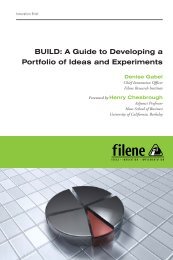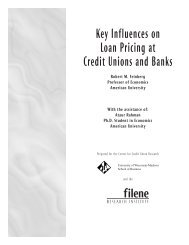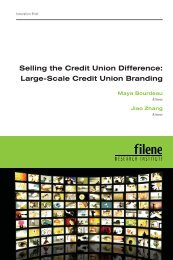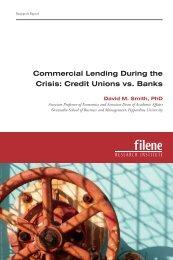Credit Union and Cooperative Patronage Refunds - Filene ...
Credit Union and Cooperative Patronage Refunds - Filene ...
Credit Union and Cooperative Patronage Refunds - Filene ...
You also want an ePaper? Increase the reach of your titles
YUMPU automatically turns print PDFs into web optimized ePapers that Google loves.
If the co-op’s earnings are not distributed to the member in cash,<br />
they are distributed with allocated equity, each dollar of equity being<br />
identified with a member on the basis of the member’s proportional<br />
use. Each dollar of allocated equity that is eventually redeemed is<br />
redeemed at no more than its face value. But in the meantime, until<br />
the allocated equity is redeemed, it does not appreciate in value. In<br />
fact, the longer the co-op uses <strong>and</strong> holds the equity, the more the<br />
equity is depreciated from the effect of the time value of money.<br />
But as soon as the co-op has surplus working capital, allocated equity<br />
is redeemed <strong>and</strong> returned to members. The co-op is motivated to<br />
distribute surplus working capital rather than reinvest it in the co-op<br />
because aggr<strong>and</strong>izing itself over its members benefits no one <strong>and</strong> is<br />
counter to the philosophy under which the co-op is formed. The<br />
board of directors is motivated to distribute surplus working capital<br />
through equity redemptions because each director—like every other<br />
member—eventually wants that surplus capital if <strong>and</strong> when the<br />
co-op can afford to return it.<br />
This same dynamic does not exist in an IOF, because the principles<br />
of subordination of capital, service at cost, <strong>and</strong> co-op agency theory<br />
are not in play. Obviously some investors desire dividends, while<br />
others desire retention of earnings <strong>and</strong> appreciation in the value of<br />
their holdings. But the IOF decides what to do with its earnings by<br />
reference to their impact on the IOF’s value, not, as a co-op does,<br />
by reference to the extent that the co-op integrates <strong>and</strong> adds value to<br />
members’ lives or businesses. An IOF is a supplier to customers, not<br />
an agent of its members or an extension of their lives or businesses.<br />
Finally, consider that an IOF’s universe of investors is narrow, limited<br />
by the number of shares of common stock the IOF has issued.<br />
Hence, the number of claims on earnings is finite. A finite number<br />
of shares means that as the value of the business increases, the same<br />
number of shares is now more valuable than before the increase in<br />
the value of the business.<br />
By comparison, an open membership co-op’s universe of members<br />
is dynamic <strong>and</strong> exp<strong>and</strong>ing all the time. The number of claims on<br />
earnings in an open membership cooperative is infinite, limited<br />
only by the number of co-op members <strong>and</strong> their proportion of the<br />
business of all members combined. Because at the co-op’s dissolution<br />
the remaining proceeds are distributed on the basis of historical<br />
patronage to present <strong>and</strong> former members, the longer that an open<br />
membership is in business before dissolution, the more claims that<br />
are created from present <strong>and</strong> former members who are entitled to a<br />
portion of the remaining proceeds at the co-op’s dissolution.<br />
14








